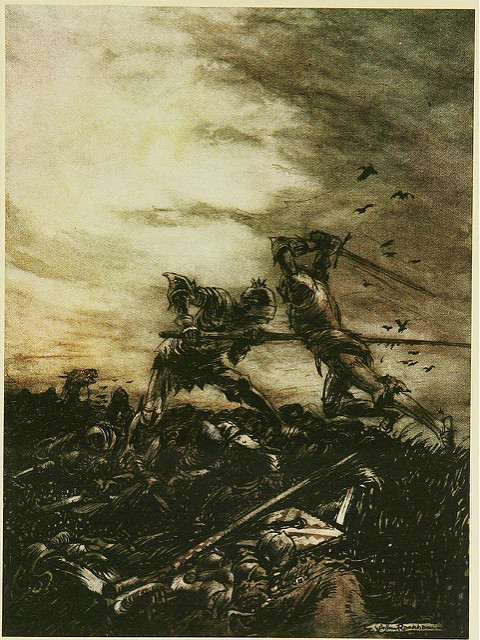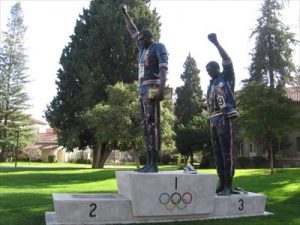Have you ever heard of the famous holy sword of legend, Excalibur? And do you know who wielded such a weapon? Who was the one to pull the sword from the stone? Only he would be deemed worthy of the crown to become Britain’s king. This man was the famous, legendary King Arthur. If you have never heard of Arthur Pendragon, I hope that I can give you a quick gist of his character, particularly the legend of King Arthur and the Battle of Camlann.
King Arthur is the legendary ruler over Britain and was considered a hero by his people. He is famously known for defending Britain from the invasion of the Anglo-Saxons in the sixth century. Early accounts of Arthur describe him as a warrior for Britain and a very successful one at that.1 Mordred, who in Arthur’s legend is Arthur’s son, was deemed a traitor by his own people for rebelling against his own father. This was the prelude to the famous Battle of Camlann.

King Arthur is signified as having strong Celtic values and chivalry. There is debate as to whether Arthur is a historical figure at all, and whether legends credited to him are true, but there is evidence of a famous “Arthur” in history. The earliest mentions of Arthur date back to the seventh century.2 Arthur was described primarily as a king of war, and as time went on, his legendary activity was popularized.3 Arthur is also known for his famous Knights of the Round Table, for his relationship with Sir Lancelot, and for his holy sword, Excalibur. In the Arthurian legend, Arthur’s son Mordred is also his nephew. Arthur conceived Mordred without knowledge of his incest, and this sin furthermore brings him trouble.4
Arthur’s son Mordred was conceived due to Arthur’s incest with his half-sister Morgause. Arthur did not seem to know that Morgause was his half-sister. When Mordred became a young adult, he became one of Arthur’s knights of the Round Table and aspired to be like his father in the sense that he would someday assume the throne. In order to be one of those knights, one had to be recognized as someone with incredible skill, leadership, honor, and chivalry. Mordred eventually got a small taste of what it would be like to take his father’s place. Arthur left the kingdom and his queen, Guinevere, in Mordred’s hands when he departed for Rome. Unfortunately, during this time Mordred decided to betray his father, assume the throne, and marry Guinevere.5 Because of this, Mordred is partly to blame for the downfall of Arthur’s reign and of Camelot.6 Arthur, when he heard of these events, came back to Camelot to take back what was rightfully his. What ensued was… the Battle of Camlann.
The Battle of Camlann is believed to be the historical Battle of Mount Badon, thought to have taken place in the late fifth or early sixth century. This is where Arthur is said to have fought his last battle against the Anglo-Saxons. In the mythos, the Battle of Camlann accounts for the fight between Arthur and his son Mordred. It is believed that because of Mordred’s treason, he himself joined the Anglo-Saxons to fight against his father and take over Camelot. He supposedly promised them land in the instance that they would defeat Arthur, his knights, and his army.7 Arthur pushed Mordred’s forces back, but at the expense of losing some very important knights. Mordred then tried to hide from his father’s wrath. Arthur pursued Mordred to the river Camlann, where both armies inevitably collide. Arthur and Mordred fought to the death, and in the end Arthur thrust a spear straight through Mordred as he lunged at him. With his dying breath, Mordred fatally wounded Arthur, which eventually caused his death as well.
- Nennius (translated by John Allen Giles), History of the Britons (Historia Brittonum) (London, J. Bohn, 1841), 46-50. ↵
- Salem Press Encyclopedia, January 2016, s.v. “King Arthur (legendary British King),” by Linda W. Beech. ↵
- Michael J. Curley, Geoffrey of Monmouth (New York: Twayne Publishers, 1994), 95-96. ↵
- Salem Press Encyclopedia, November 2016 s.v. “Arthurian Legend,” by John K. Manos. ↵
- Amy Varin, “Mordred, King Arthur’s Son,” Folklore vol. 90, no. 2 (1979): 167. ↵
- Salem Press Encyclopedia, November 2016 s.v. “Arthurian Legend,” by John K. Manos. ↵
- Michael J. Curley, Geoffrey of Monmouth (New York: Twayne Publishers, 1994), 95-96. ↵



54 comments
Roman Olivera
This is a good brief version of King Arthur’s life, though the accounts of his life are largely made up and not written about, there are many spins on what have happen to lead to the fall and death of King Arthur. There at many great historical fiction base books based on the Life of King Arthur to include Bernard Cornwell’s books the Winter King, Enemy of God and Excalibur, which are considered by many to be the closest to the truths about King Arthur. Great article but we still have to remember how little was actually written historically about him personally.
Montserrat Moreno Ramirez
This a good and well written summary of his story. Everyone knows the story of the great Arthur and many of his adventures. I am familiarized with this because there’s even a tv show in Netflix called “Merlin” where you can see how the story came to happen. I think it’s really interesting the amount of myth and magic surrounding this tale, how fate is always involved and how is still a relevant text or story.
Esperanza Rojas
The article was well written in the sense that it got all of the information needed through. I liked the the brief summary in the beginning of the article since it reminded the reader of who King Arthur was. The legend itself was amazing to read about. I know very little about King Arthur and it’s only the basics, so it was more than astonishing and disturbing to read thay his son was also his nephew. What I was a little confused was how did he find out that was his nephew and that he had intercourse with his half-sister, according to the myth. The myth itself makes me wonder where it originated from and how it became so popular, this is something that could have been included in the article.
Greyson Addicott
The English and European skill in mixing mythos with reality is truly something to admire. The civilization that the Britons created, even before Empire, was steeped in pride, culture and history. I cannot help but feel blessed to have come from such a great and legendary line of people. From the middle ages, to the height of the British Empire, they never lost their roots. Queen Elizabeth is a living representation of that ideal today. The article blended the stories together seamlessly, never bringing us out of the action, and for that, it should be praised!
John Smith
I’ll admit that I do find it a little surprising that the legendary King Arthur participated in incest. At least it was only his half-sister, I’m sure that there was plenty of incest among royalty at the time. It is very poetic that Arthur and his very Mordred would end up killing each other. It goes to just cement Arthurs legend and influence on British history.
Jocelyn Moreno
Wow, I’ve always heard of Arthur but never have I really throughly learned about him. I find it odd how historians don’t know whether to qualify him as a historical figure when he was clearly very “famous” and made a lot of history back in his day. I loved the way you organized the article, it was very informative!
John Berka
This article surprised me with the knowledge that King Arthur could have been based in history, and not just a fun story. I have always loved the story of King Arthur and the Knights of the round table, and Excalibur. That was a jerk move on Mordred’s part. I mean not only did he take the throne, but he married Arthur’s wife too. That’s real cold.
Alexander Manibusan
I remember we had to read a book called The Sword of the Rightful King in my middle school. It was a novel which told the story of how King Arthur became king. I always found this part of history a bit strange. Although the idea of a legendary sword and a great king and great knights do all seem very pleasing, how is it that there doesn’t seem to be much evidence for King Arthur? How is it that someone so influential has so little history?
Natalia Flores
The legend of Arthur and Excalibur is in itself a legend since even though they are both thought to have existed, it is still debated if both existed together. It always fascinates me to hear about Arthur and his battles. It always creeps me out how Arthur had a son/nephew with his half sister, but it makes me sad when he fights his son. How could Mordred hate his father so much? And how could Mordred marry Guinevere?
Carlos Vazquez
The first time I heard of King Arthur was when I heard the story of the sword in the stone. I always assumed he was fictional and it is interesting to see he may have been an actual historical figure in Britain. I also had never heard of about his son Mordred. This article was well written and informative, I really enjoyed reading it.